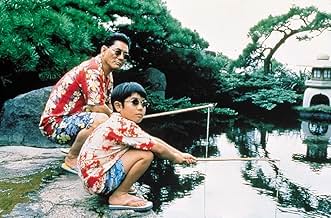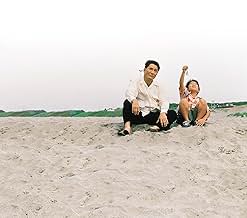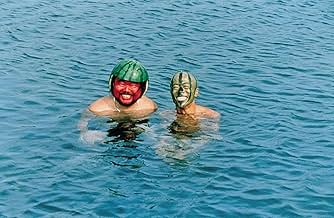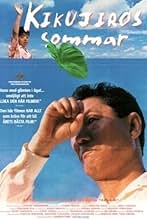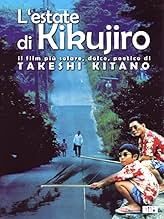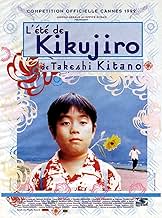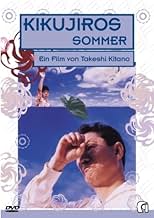IMDb रेटिंग
7.7/10
23 हज़ार
आपकी रेटिंग
एक युवा, भोला लड़का अपनी स्वच्छंद माँ को खोजने के लिए सड़क पर अकेला निकल जाता है. जल्द ही वह एक कट्टर आदमी में एक अप्रत्याशित रक्षक को पाता है और दोनों के साथ रास्ते में कई सारी अप्रत्याशित ... सभी पढ़ेंएक युवा, भोला लड़का अपनी स्वच्छंद माँ को खोजने के लिए सड़क पर अकेला निकल जाता है. जल्द ही वह एक कट्टर आदमी में एक अप्रत्याशित रक्षक को पाता है और दोनों के साथ रास्ते में कई सारी अप्रत्याशित घटनाएं घटित होती हैं.एक युवा, भोला लड़का अपनी स्वच्छंद माँ को खोजने के लिए सड़क पर अकेला निकल जाता है. जल्द ही वह एक कट्टर आदमी में एक अप्रत्याशित रक्षक को पाता है और दोनों के साथ रास्ते में कई सारी अप्रत्याशित घटनाएं घटित होती हैं.
- पुरस्कार
- 4 जीत और कुल 4 नामांकन
Takeshi Kitano
- Kikujiro
- (as Beat Takeshi)
The Great Gidayû
- Biker
- (as Gurêto Gidayû)
Beat Kiyoshi
- Man at Bus Stop
- (as Bîto Kiyoshi)
Yôji Tanaka
- Yakuza Henchman
- (as Yoji Tanaka)
फ़ीचर्ड समीक्षाएं
By 1999 Takeshi Kitano had quite rightly gained a lot of international recognition for his brilliantly constructed Yakuza/Cop stories, but was apparently dis-satisfied that everybody tended to focus on the violence in them. So he decided to make a movie without any violence to remind people that he was a much more rounded talent than that. "Are you sure about this?", the world asked. "Yes", he replied... and made Kikujiro.
Kikujiro is difficult to adequately describe, but the fact that it was allegedly inspired by the Wizard of Oz is a good starting point. The basic premise is a road trip, where Kitano is the unlikely chaperone for a little boy who wants to go and find his mother. After gambling away all the money his wife gives him to take the kid, they have to improvise their transport across the country. Along the way they meet a small but colourful cast of characters, and get to know each other a little bit too.
I'd hesitated about picking this up for ages, and eventually went for a rental rather than a purchase. Kitano minus violence just didn't seem right! But that was definitely an injustice I was doing him, and Kikujiro is a good demonstration that his talents really are much broader. In fact, after watching it there is no doubt that he is one of the greatest director/actor/writer and editor working in the world today. A brilliantly painted story, full of subtly and quirkiness. Awesome cinematography and an incredible soundtrack... truly world class in every respect. Well, to be fair the child actor was a bit stiff, but it seems mean to hold that against the movie.
Definitely recommended if you haven't already seen it!
Kikujiro is difficult to adequately describe, but the fact that it was allegedly inspired by the Wizard of Oz is a good starting point. The basic premise is a road trip, where Kitano is the unlikely chaperone for a little boy who wants to go and find his mother. After gambling away all the money his wife gives him to take the kid, they have to improvise their transport across the country. Along the way they meet a small but colourful cast of characters, and get to know each other a little bit too.
I'd hesitated about picking this up for ages, and eventually went for a rental rather than a purchase. Kitano minus violence just didn't seem right! But that was definitely an injustice I was doing him, and Kikujiro is a good demonstration that his talents really are much broader. In fact, after watching it there is no doubt that he is one of the greatest director/actor/writer and editor working in the world today. A brilliantly painted story, full of subtly and quirkiness. Awesome cinematography and an incredible soundtrack... truly world class in every respect. Well, to be fair the child actor was a bit stiff, but it seems mean to hold that against the movie.
Definitely recommended if you haven't already seen it!
If it wasn't for the perverted old man and the language, this would probably be a really good children's movie. Who knows, maybe it's intended to be...
Anyway, little Masao lives with his grandmother and has never met his parents: his father is dead and his mother ran away. He knows where his mother lives, however, and wants to go visit her over the Summer, so his kindly neighbor conscripts her profligate husband to take him. "Mister", as Masao calls him, doesn't make the ideal companion with his absurd behavior and his verbal abuse, but they go off to adventure anyways and learn to really connect with each other.
The power this film has lies mostly in its contemplative approach. It's very humorous and isn't really slow, but the camera does take the time to linger on locales, faces, and characters. For a few odd parts here and there, it's still really innocent and it seems to show that most people are kind-natured at heart, even when they project an aura of toughness and abusiveness. An interesting aside to analyze that theme would be the carnival scene, where people entrusted with family entertainment turn out to be violent cheaters, whereas even the heavy-metal biker folk are more than willing to go out of their way to help Masao.
The film itself is from Masao's perspective, as a childhood's slightly photographic memory comes into play, mixed a lot with colorful imagination. The humor is the best part, as it is at times really simple but holds itself up well. There's a lot to enjoy in this film.
--PolarisDiB
Anyway, little Masao lives with his grandmother and has never met his parents: his father is dead and his mother ran away. He knows where his mother lives, however, and wants to go visit her over the Summer, so his kindly neighbor conscripts her profligate husband to take him. "Mister", as Masao calls him, doesn't make the ideal companion with his absurd behavior and his verbal abuse, but they go off to adventure anyways and learn to really connect with each other.
The power this film has lies mostly in its contemplative approach. It's very humorous and isn't really slow, but the camera does take the time to linger on locales, faces, and characters. For a few odd parts here and there, it's still really innocent and it seems to show that most people are kind-natured at heart, even when they project an aura of toughness and abusiveness. An interesting aside to analyze that theme would be the carnival scene, where people entrusted with family entertainment turn out to be violent cheaters, whereas even the heavy-metal biker folk are more than willing to go out of their way to help Masao.
The film itself is from Masao's perspective, as a childhood's slightly photographic memory comes into play, mixed a lot with colorful imagination. The humor is the best part, as it is at times really simple but holds itself up well. There's a lot to enjoy in this film.
--PolarisDiB
From its hauntingly beautiful soundtrack by Joe Hisaishi to the wonderful characters who inhabit Takeshi Kitano's magical Japan - everything in this movie comes together to make this one of modern cinema's truly underrated masterpiece.
The story involves a petty thug, Kikujiro, who is coerced into accompanying a young boy, Masao, on his cross country journey to find his birth mother. Along the way they meet a whole host of characters. Some friendly, some mysterious, some quirky, some abrasive, but all of them refreshingly human.
A lesser writer or director would have settled for a quick dose of weirdness from the main characters' fellow wanderers, but Takeshi Kitano milks them for all of the depth and endearment that the too few minutes we are graced with their presence allows.
If you enjoyed the whimsical, go-nowhere feel of Lost in Translation, you will LOVE this movie. In my opinion Beat Takeshi's efforts blow Sophia Coppola's out of the water.
Nine out of ten.
The story involves a petty thug, Kikujiro, who is coerced into accompanying a young boy, Masao, on his cross country journey to find his birth mother. Along the way they meet a whole host of characters. Some friendly, some mysterious, some quirky, some abrasive, but all of them refreshingly human.
A lesser writer or director would have settled for a quick dose of weirdness from the main characters' fellow wanderers, but Takeshi Kitano milks them for all of the depth and endearment that the too few minutes we are graced with their presence allows.
If you enjoyed the whimsical, go-nowhere feel of Lost in Translation, you will LOVE this movie. In my opinion Beat Takeshi's efforts blow Sophia Coppola's out of the water.
Nine out of ten.
It is summertime, and Masao is a lonely boy living with his grandmother in Tokyo. One day, he finds an address supposedly belonging to his long-lost mother, and decides to try and find her. His grandmother's friend insists that her husband, Kikujiro, accompany Masao, and the two set out together; despite not knowing each other well. On their long journey, Kikujiro and Masao engage in many adventures, meeting colourful characters along the way and forging a bond stronger than that between parent and child. Whether or not their friendship withstands the test of time- and if they find Masao's mother- remains to be seen in the dramatic powerhouse that is Takeshi Kitano's 'Kikujiro.'
Kitano's eighth feature film, 'Kikujiro' is a delightfully funny and poignant road movie sure to warm the cockles of any viewers' heart. A simple story about friendship and connection, the trip Masao and Kikujiro undertake contains subtle power and emotional depth, whilst also being frequently hilarious. The characters are all well-drawn and the escapades they engage in both wildly entertaining and affecting. The relationship that develops between Masao and Kikujiro is realistic and heart-warming, and the film's exploration of those considered 'outsiders' is one most intelligent and subdued. Much like Kitano's previous 'A Scene At The Sea,' the film's power is of the low-key and naturalistic variety; and 'Kikujiro' will surely linger in the mind long after the credits have rolled.
'Kikujiro' reunites Kitano with cinematographer Katsumi Yanagishima, for their sixth out of sixteen collaborations. Yanagishima's muted work is undeniably powerful and beguiling, lending the film and its' story additional beauty and depth. His is not pretentious or needlessly hectic cinematography, it is steady and sure work that produces sagacious, artful and distinct results. That Kitano has utilised Yanagishima's immeasurable talents for every one of his movies bar 'Violent Cop' and 'Hana-Bi' proves just how effectively the two men work together; and the visuals borne of their partnership for 'Kikujiro' are unforgettable.
The same can be said of another frequent collaborator of Kitano's, composer Joe Hisaishi: his score for 'Kikujiro' is catchy and evocative. The fifth film of Kitano's Hisaishi has worked on, his melodies are haunting and delicate. The theme, 'Summer,' is particularly beautiful, and like an earwig worms it's way into one's subconscious, establishing itself as a tune one will find it most difficult to forget. Hisaishi frequently plays the 'Kikujiro' soundtrack while touring, and the enduring popularity of the music shows just how moving and ineffaceable it is.
'Kikujiro' also boasts highly detailed costume design from Fumio Iwasaki that lends additional dimension to characters, as well as echoing past works from Kitano's cinematic canon (most notably through the short sleeved Hawaiian shirts featured so prominently in 'Sonatine'). Also of note is Ryôji Kasumi and Michio Miyauchi's work in the makeup department and Tatsuo Ozeki's rich set decoration; which adds further believability to the proceedings.
'Kikujiro' stars Kitano in the titular role and Yusuke Sekiguchi as Masao, making his big screen debut. Sekiguchi is a fine actor who remains understated throughout, crafting in Masao a character both believable and compelling. It could be argued that he has the least to do in the cast- certainly he has relatively little dialogue or any large displays of emotion- and that many other young boys could have played the role as effectively. However, that is to do a serious discredit to the subtlety of his acting. Though he only has one other film role to date, Sekiguchi has left an indelible imprint on cinema through his brilliant performance as Masao.
Kitano is terrific as Kikujiro, making him a slightly unhinged comedic force of nature, as well as a profoundly complex man. His relationship with Masao forces him to examine his own life, which he finds wanting; and Kitano's performance is powerfully understated and wildly entertaining. It is assumed that Kikujiro is a facsimile of Kitano's own father, and the fondness and exuberance with which he approaches the role betrays a great respect, admiration and love for the man. Kitano's Kikujiro may be one of his finest performances from his storied career; and is certainly his warmest and most heartfelt.
The supporting cast is populated with talented actors like Kayoko Kishimoto and Akaji Maro, both of whom steal their too few scenes as Kikujiro's wife and a seedy fellow Masao encounters in a park, respectively. All the secondary performers do admirable work, with Nezumi Imamura, Gurêto Gidayû and Rakkyo Ide impressing and entertaining the most as a travelling writer and two bikers Masao and Kikujiro befriend along the way. From the smallest role to the titular one; everyone in the film is perfectly cast.
'Kikujiro' is a powerful, funny and genuinely moving film from Takeshi Kitano that impresses on every level. Strongly acted, well-written and featuring stunning cinematography from Katsumi Yanagishima; the movie is entertaining and memorable both. With an atmospheric Joe Hisaishi score and detailed costume and set design; there is little to fault with the film. In short, 'Kikujiro' is a bittersweet symphony of unaffected profundity and voluminous emotional depth that hits all the right notes.
Kitano's eighth feature film, 'Kikujiro' is a delightfully funny and poignant road movie sure to warm the cockles of any viewers' heart. A simple story about friendship and connection, the trip Masao and Kikujiro undertake contains subtle power and emotional depth, whilst also being frequently hilarious. The characters are all well-drawn and the escapades they engage in both wildly entertaining and affecting. The relationship that develops between Masao and Kikujiro is realistic and heart-warming, and the film's exploration of those considered 'outsiders' is one most intelligent and subdued. Much like Kitano's previous 'A Scene At The Sea,' the film's power is of the low-key and naturalistic variety; and 'Kikujiro' will surely linger in the mind long after the credits have rolled.
'Kikujiro' reunites Kitano with cinematographer Katsumi Yanagishima, for their sixth out of sixteen collaborations. Yanagishima's muted work is undeniably powerful and beguiling, lending the film and its' story additional beauty and depth. His is not pretentious or needlessly hectic cinematography, it is steady and sure work that produces sagacious, artful and distinct results. That Kitano has utilised Yanagishima's immeasurable talents for every one of his movies bar 'Violent Cop' and 'Hana-Bi' proves just how effectively the two men work together; and the visuals borne of their partnership for 'Kikujiro' are unforgettable.
The same can be said of another frequent collaborator of Kitano's, composer Joe Hisaishi: his score for 'Kikujiro' is catchy and evocative. The fifth film of Kitano's Hisaishi has worked on, his melodies are haunting and delicate. The theme, 'Summer,' is particularly beautiful, and like an earwig worms it's way into one's subconscious, establishing itself as a tune one will find it most difficult to forget. Hisaishi frequently plays the 'Kikujiro' soundtrack while touring, and the enduring popularity of the music shows just how moving and ineffaceable it is.
'Kikujiro' also boasts highly detailed costume design from Fumio Iwasaki that lends additional dimension to characters, as well as echoing past works from Kitano's cinematic canon (most notably through the short sleeved Hawaiian shirts featured so prominently in 'Sonatine'). Also of note is Ryôji Kasumi and Michio Miyauchi's work in the makeup department and Tatsuo Ozeki's rich set decoration; which adds further believability to the proceedings.
'Kikujiro' stars Kitano in the titular role and Yusuke Sekiguchi as Masao, making his big screen debut. Sekiguchi is a fine actor who remains understated throughout, crafting in Masao a character both believable and compelling. It could be argued that he has the least to do in the cast- certainly he has relatively little dialogue or any large displays of emotion- and that many other young boys could have played the role as effectively. However, that is to do a serious discredit to the subtlety of his acting. Though he only has one other film role to date, Sekiguchi has left an indelible imprint on cinema through his brilliant performance as Masao.
Kitano is terrific as Kikujiro, making him a slightly unhinged comedic force of nature, as well as a profoundly complex man. His relationship with Masao forces him to examine his own life, which he finds wanting; and Kitano's performance is powerfully understated and wildly entertaining. It is assumed that Kikujiro is a facsimile of Kitano's own father, and the fondness and exuberance with which he approaches the role betrays a great respect, admiration and love for the man. Kitano's Kikujiro may be one of his finest performances from his storied career; and is certainly his warmest and most heartfelt.
The supporting cast is populated with talented actors like Kayoko Kishimoto and Akaji Maro, both of whom steal their too few scenes as Kikujiro's wife and a seedy fellow Masao encounters in a park, respectively. All the secondary performers do admirable work, with Nezumi Imamura, Gurêto Gidayû and Rakkyo Ide impressing and entertaining the most as a travelling writer and two bikers Masao and Kikujiro befriend along the way. From the smallest role to the titular one; everyone in the film is perfectly cast.
'Kikujiro' is a powerful, funny and genuinely moving film from Takeshi Kitano that impresses on every level. Strongly acted, well-written and featuring stunning cinematography from Katsumi Yanagishima; the movie is entertaining and memorable both. With an atmospheric Joe Hisaishi score and detailed costume and set design; there is little to fault with the film. In short, 'Kikujiro' is a bittersweet symphony of unaffected profundity and voluminous emotional depth that hits all the right notes.
Maybe Takeshi Kitano remembered his travel with his father (Kikujiro), maybe he just wanted to show his father just like he wanted to see him. Anyway this film, despite of very few words and quite simple dialogue lines, shows so many emotions that after seeing it, sometimes laughing, sometimes sad and full of empathy, i have spent many days thinking of it. How can grown-up simple man witch is not quite good in relationships with people, can spent so much time with little boy. How so violent person can show beautiful world to sad little boy. Takeshi is one of my favorite actor/director/writer. I discovered him just by being bored with all-the-same Hollywood movies. Now, thanks to him, I'm truly in "love" with Asian movies. For those who liked this movie, and wants to see some good others, see the Hana-Bi (little violent, but even more deep) and Dolls (i was crying - one reason was i was touched, second - beauty of the colors and form).....For me its just one word - Outstanding.
क्या आपको पता है
- ट्रिवियाTakeshi Kitano made this gentler film as an antidote to his usual violent gangster movies.
- क्रेज़ी क्रेडिटThere's one more scene after the credits.
- कनेक्शनFeatured in Jam session - Kikujiro no natsu koshiki kaizokuban (1999)
- साउंडट्रैकSummer
Written by Joe Hisaishi
टॉप पसंद
रेटिंग देने के लिए साइन-इन करें और वैयक्तिकृत सुझावों के लिए वॉचलिस्ट करें
- How long is Kikujiro?Alexa द्वारा संचालित
विवरण
- रिलीज़ की तारीख़
- कंट्री ऑफ़ ओरिजिन
- आधिकारिक साइटें
- भाषा
- इस रूप में भी जाना जाता है
- Kikujiro
- फ़िल्माने की जगहें
- Sensoji Temple, Asakusa, Taito, टोक्यो, जापान(Masao and his friend walk across the temple grounds)
- उत्पादन कंपनियां
- IMDbPro पर और कंपनी क्रेडिट देखें
बॉक्स ऑफ़िस
- US और कनाडा में सकल
- $2,00,920
- US और कनाडा में पहले सप्ताह में कुल कमाई
- $28,079
- 28 मई 2000
- दुनिया भर में सकल
- $2,81,527
- चलने की अवधि
- 2 घं 2 मि(122 min)
- रंग
- ध्वनि मिश्रण
- पक्ष अनुपात
- 1.85 : 1
इस पेज में योगदान दें
किसी बदलाव का सुझाव दें या अनुपलब्ध कॉन्टेंट जोड़ें


